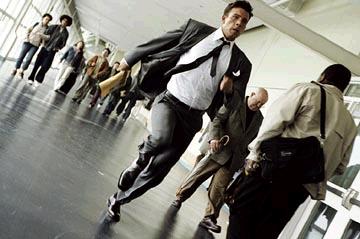

Sometimes, mixing two good things together will not always yield a better, chocolate/peanut butter-like confection, and Paycheck is the perfect example of this. Director John Woo (Windtalkers, Mission Impossible II), at least when he was working exclusively in Hong Kong, blazed his way through a series of great action movies, creating techniques, flourishes, and action styles that are now copied the world over. Author Philip K. Dick's short stories have become the basis for classic science fiction films like Blade Runner and Total Recall, and recent films like Minority Report and the much lesser Impostor. One would think that Woo directing a Dick-inspired film would be something fantastic, but Paycheck is not this film.
For one, the two have different styles. Woo works much better on a superficial level, where stunts and explosions can cover up for a lack of other things, like characterization and story. Dick's stories are the antithesis of this, and are about ideas more than anything else. Paycheck dumbs down Dick and then takes away many of the big explosions Woo likes, giving a lesser amalgam of the two; still enjoyable, but without any depth of meaning. Worse, it stars Ben Affleck (Gigli, Daredevil), who, with each additional movie proves that he does not have what it takes to be a leading man. His delivery is too often wooden, and he has a difficult time expressing the more complex emotions. Paycheck also comes out relatively quickly after The Bourne Identity, a better film with a similar story structure.
Affleck plays Michael Jennings, a corporate espionage agent that companies hire to reverse engineer their rivals' products. They then erase all memories of his work from his mind, removing all evidence and liability. Jennings' latest project for his old friend Rethrick (Aaron Eckhart, The Missing, The Core) is much longer than all his previous assignments, but also much more lucrative. He goes under for three years, then wakes up to find he has forfeited millions of dollars worth of stock options, leaving himself a bag of random items like a fortune, access card, crossword puzzle, and hair spray. Jennings has no clue why he would do this to himself, but soon realizes that he left them as clues to himself. Paycheck becomes a race for Jennings to figure out what each item means, and what he exactly he worked on.
Enter Rachel Porter (Uma Thurman, Kill Bill Vol. 1, Tape), who also works for Rethrick. In the intervening three years, Porter and Jennings fell in love, but now Jennings has no memory of this. Together, they try to dodge Rethrick's men and some FBI Agents who are trying to get Jennings. Along the way are typical Woo flourishes like a random dove and the face-off where two men are pointing guns at each other's faces, otherwise, Paycheck doesn't lend itself too much to a big action film. Dean Georgaris' (Lara Croft Tomb Raider: The Cradle of Life) lends itself more to a typical chase movie, with the only exception being that it takes place in the future and that Affleck has a personal bag of tricks to use.
The gimmick of having twenty objects to help, but not knowing what they are for, remains nothing more than a gimmick. Yes, everything makes sense within the film, but the plot relies too much on coincidences of Jennings knowing instinctively what to use and when to use it. Five or six objects is fine, but the twenty objects here pushes things way too far, and Affleck's underacting is not enough to draw the viewer back into the story. This is left to some of the supporting characters, reliable standbys like Joe Morton (Dragonfly, Ali), Colm Feore (National Security, Chicago) and a recently blossoming Paul Giamatti (American Splendor, Confidence) to hold down the fort. It's too bad that they appear too infrequently to make much of a difference.